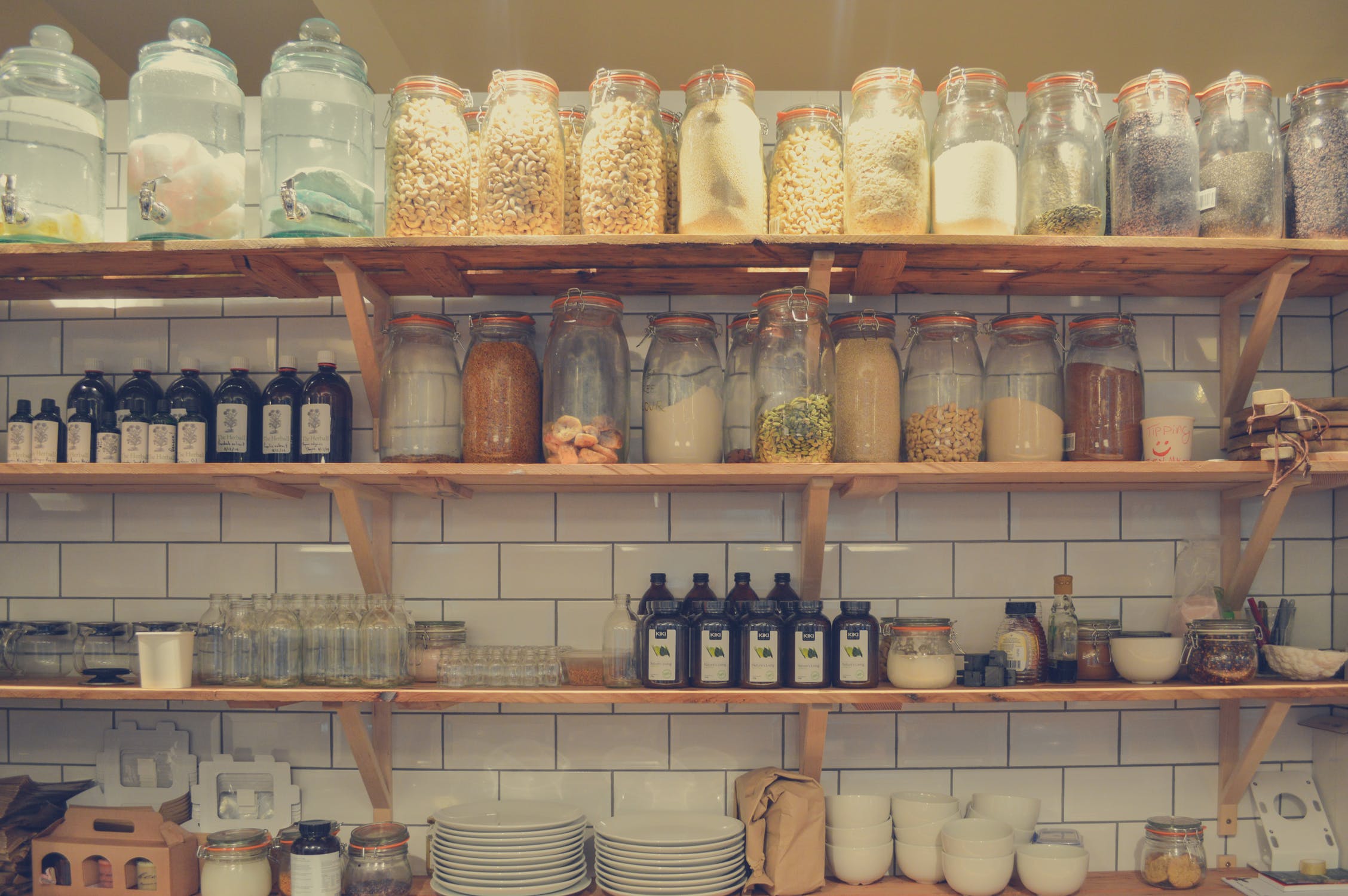
LISTEN NOW!!
The key to successful healthy nutrition starts in the kitchen.
Taking the time to properly set yourself up is step one for transitioning to a healthier and more sustainable way of life. In this post/podcast we will explains how to properly set yourself up to optimize your plant-based diet and ultimately succeed by consuming the highest quality ingredients.
“Let food be thy medicine and medicine be thy food.”
– Hippocrates
Making dietary changes is far from easy. It’s even more difficult to change your eating habits if you stay surrounded by all those “tempting” foods that have been a part of your everyday life for years.
And let’s face it, if a certain food is in your house, car, purse or anywhere in your possession, either you or someone you care about will eventually eat it.
For that reason, your very first step to take ,that will set you up for success, is to clean up your kitchen. Yes, that means all the junk (we mean all of it), then restocked with nutritious, health-promoting foods.
Where to start?
You will need to go over all of the items in your pantry, refrigerator and freezer. Read on or listen to this episode as we give you clues on what to look for in order to determine how “safe” that particular item is. If it is safe, it stays; if the ingredients don’t fit the provided criteria or you are unsure, then it goes. Simple as that.
Now let’s get started…
Pantry/Refrigerator/Freezer Makeover
“If it came from a plant, eat it; if it was made in a plant, don’t.”
– Michael Pollan, Food Rules
Your task is to throw away all animal products (you can keep raw honey if you would like), foods that contain chemicals such as preservatives, coloring or artificial flavors, as well as enriched foods and anything that will hinder your journey.
Your Assignment: OUT with the Junk and IN with the Healthy
Step #1
Get a few large garbage bags and some cardboard boxes.
Step #2
Go through your refrigerator, freezer and pantry—one by one and throw away all of the following:
Animal Products
- Butter or cream
- Eggs
- Cheese
- Milk, cream, yogurt
- Meats, poultry, lamb or beef
- Processed meats such as hot dogs, bacon and deli meats
- Fish, shellfish, shrimp or lobster
- Gelatin

Junk Food
- Chips (of all kinds)
- Chocolates or candy
- Soda/pop and sweetened drinks, diet soda, sports drinks
- Alcohol, especially flavored/sweetened mixed drinks
- Instant foods like cake mixes, dried soups, mashed potatoes, flavored oatmeal packets
- Margarine and other processed fats
- Cooking oils (all except high-quality organic coconut, hemp, flax or extra virgin olive oil)
- Frozen dinners/entrées
- Breads and bagels, unless they’re made exclusively with whole sprouted grains
- Other baked goods
- Boxed breakfast cereals
- Crackers, even the whole-grain ones
- Fruit, cereal and/or granola bars
- Peanut butter—any kind!
- Fruit juice
- Takeout or restaurant leftovers
- Any other “snack-like” foods
- Condiments such as barbecue and other sweetened sauces
- Sweetened relishes, mustards and ketchup
- Salad dressings
- Sugars and sweeteners (except coconut sugar, maple syrup, honey, molasses and stevia)
- Bread crumbs, croutons and other dried bread products
- Nuts and seeds (keep raw ones, unless they smell rancid)
And also trash any food that:
- Contains ingredients that no ordinary human would keep in the pantry
- Arrived through the window of your car
- Contains high-fructose corn syrup
- Has more than five ingredients (some exceptions may apply)
- Has the word light or the terms “low-fat” or “non-fat” in its name
- You see it advertised on television
Q: What about meat substitutes?
We understand that Tofu-Pups, Tofurky, veggie burgers, Fakin’ Bacon and such could be appealing, especially to someone who is just starting to transition into a plant-based lifestyle,
BUT . . .
…these products are far from healthy! In most cases what you get is highly processed, chemically altered, high in sodium and often genetically modified crap. So in other words, stay away.
Struggling with the idea of throwing away food?
If it’s really challenging for you to throw away food, then donate a box of perishable items to your local food bank.
Step #3
Don’t panic if your kitchen is totally bare. Take it as a new beginning; a clean slate.
Q: What if I’m having doubts?
It’s much easier to make a change and stick to a healthy plant based lifestyle if you understand the science behind this approach.
Q: Why is eating whole plant based diet dramatically better for your health?
Being clear about your “whys” is crucial for your success. If you are still contemplating and perhaps already questioning if throwing away all that junk food was one big mistake, you might need some help. We highly suggest watching one or more of the following documentaries:
- Forks Over Knives
- Vegucated
- Earthlings (Link To Watch Now!)
- Fat, Sick and Nearly Dead
- Simply Raw: Reversing Diabetes in 30 Days
Step #4
Plan your meals for the week.
Big part of our ActiveVegetarian.com blog as well as our books is dedicated to a variety of easy-to-make, tasty plant-based recipes. Look over them and put together a few days’ worth of meal plans. Aim to plan for 4 to 7 days ahead, depending on how often you grocery shop.
If you are part of our Integrated Living Program the Week #1 Meal Plan is available for you HERE.
Here is a sample of what one day of meals should look like (Our meal plans are based on five meals per day):

Step #5
Create a shopping list
Your next task is to restock your kitchen with some healthy stuff. What goes on your shopping list will be based on the recipes you have selected for your 4 to 7 day meal plan. Look at the ingredients for each of the selected recipes and create a shopping list of everything you will need to have on hand.
In our Coaching program we provide members not only with weekly meal plans but also with correlating grocery list. You can access your WEEK #1 Shopping List HERE. or download a generic blank Shopping List HERE.
Warning! Your first grocery shopping trip may seem extreme, but just remember that this will re-stock your empty cupboards and give you the base you need. From here on out, it will mostly be picking up fresh goods or refilling random items.
Step #6
Go shopping.
Step #7
Follow your designed meal plan as closely as you can.
Step #8
For support and detailed plan that will help you stay consistent check out our Integrated Living Program.
Helping you reclaim your health and full potential,


How do I clean the kitchen the way you guys want me to when I have 3 other people who aren’t on the same page as me? Also I had a friend back lash at me when I told her that I was thinking of raising my soon to be here son vegan. I didn’t know how to answer her back.
As a long time vegetarian who is raising two children as vegetarian – ignore all those silly questions. People have been asking me questions or making comments during my 5 years as a parent. I have eaten mostly plant based and am transitioning to 100% but my kids eat dairy and eggs. No one has the right to tell you how to raise your children.
Thank you so much for the encouraging words. I’m still dealing with this problem as my husband keeps fighting with me saying I’m taking his rights away as to eating meat. It’s still an on going battle, so as of right now he eats what I eat when he’s not around lol.